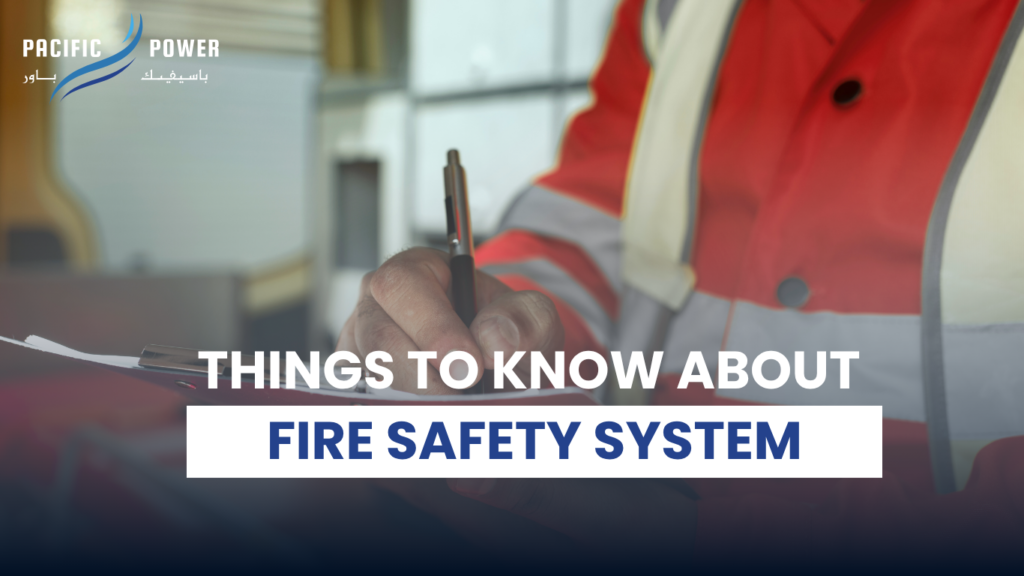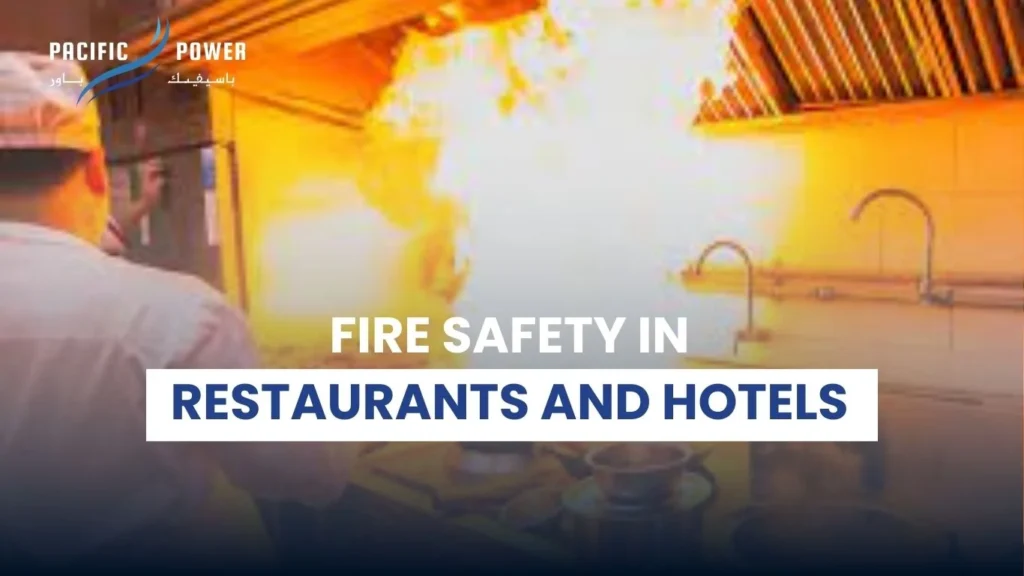
Table of Contents
Top 10 Things to Know About Fire Safety Systems
Fire safety systems are very important to protect people, buildings, and businesses in Dubai. The city is growing fast and follows strict rules from Dubai Civil Defence, so having strong fire protection is a must. From tall towers in Downtown Dubai to busy areas like Dubai Marina, these systems help keep everyone safe from fire.
In this blog, we will explain the top things you should know about fire safety systems. You’ll find useful tips, easy steps to follow, and important information for staying safe and following the rules in Dubai. Whether you own a building or warehouse, manage one, or just live in it, knowing about fire safety helps keep you and others protected.
1. What Are Fire Safety Systems?
Fire safety systems are integrated solutions designed to detect, suppress, and prevent fires while ensuring safe evacuation. They combine advanced technologies like smoke detectors, fire alarms, sprinklers, and emergency lighting to mitigate fire risks.
In Dubai, these systems must adhere to the UAE Fire and Life Safety Code, enforced by Dubai Civil Defence, which sets rigorous standards for fire protection.
For example, multi-sensor detectors integrate smoke, heat, and carbon monoxide (CO) sensors to provide early warnings, reducing false alarms in Dubai’s dusty and humid climate. These systems are critical for residential towers, offices, and industrial facilities, ensuring comprehensive fire detection and response.
Why It’s Helpful: Understanding the components and purpose of fire safety systems helps you choose the right solutions for your property, ensuring compliance and safety.
2. Why Fire Safety Systems Matter
Fire safety systems are a lifeline in Dubai’s high-risk urban environment. They save lives by providing early detection, allowing occupants to evacuate before fires escalate.
In 2024, Dubai Civil Defence reported that buildings with advanced fire safety systems had 30% faster evacuation times during fire incidents. These systems also protect property, minimizing financial losses from fire damage, which is crucial in a city with high-value real estate.
Additionally, compliance with Dubai Civil Defence regulations ensures businesses avoid fines and secure insurance approvals.
Why It’s Helpful: Knowing the stakes of fire safety empowers you to prioritize reliable systems, safeguarding your family, employees, or tenants.
3. Key Components of Fire Safety Systems
A qualified fire safety system comprises several critical components, each tailored to Dubai’s unique needs:
- Fire Detectors: Multi-sensor devices detect smoke, heat, or CO, ideal for Dubai’s diverse fire risks.
- Fire Alarms: Addressable alarms, such as those from System Sensor, pinpoint fire locations, speeding up response in large buildings.
- Fire Suppression Systems: Sprinklers, foam, or clean agent systems (e.g., FM-200) extinguish fires, protecting assets in commercial spaces.
- Emergency Lighting and Signage: These guide occupants to exits during power outages, crucial for high-rise towers.
- Control Panels: Centralized panels monitor systems, ensuring seamless coordination during emergencies.
Why It’s Helpful: Understanding these components helps you assess whether your building’s fire safety system is comprehensive, enabling informed upgrades or installations.
4. Types of Fire Safety Systems
Fire safety systems vary to address specific risks in Dubai’s buildings. Common types include:
- Fire Detection Systems: Multi-sensor detectors identify smoldering or flaming fires, suitable for residential and office spaces.
- Fire Suppression Systems: Wet sprinklers for offices, dry pipe systems for cold storage, and clean agent systems like Novec 1230 for data centers.
- Fire Alarm Systems: Addressable systems, such as Honeywell’s, are ideal for large complexes like Dubai Mall, providing precise alerts.
- Passive Fire Protection: Fire-resistant doors and walls slow fire spread, complementing active systems in high-rise buildings.
- Special Hazard Systems: These protect sensitive areas like server rooms, using gas-based suppression to avoid equipment damage.
Why It’s Helpful: Knowing the types of systems allows you to select the right solution for your building’s specific needs, ensuring optimal protection.
5. The Necessity of Regular Maintenance
Regular maintenance is non-negotiable to keep fire safety systems functional. Dubai Civil Defence mandates annual inspections by certified technicians to ensure compliance with NFPA 72 standards. Key maintenance tasks include:
- Cleaning Detectors: Dubai’s dusty environment can impair detectors like the Bosch FAP-440-DOTC, requiring regular cleaning to maintain sensitivity.
- Testing Systems: Alarms, sprinklers, and control panels must be tested to verify performance under various conditions.
- Battery and Wiring Checks: Battery-powered detectors like the System Sensor 4WT-B need battery replacements, while hardwired systems require electrical inspections.
- Documentation: Maintenance logs must be submitted to Dubai Civil Defence for compliance.
Pacific Power UAE offers maintenance contracts to streamline these tasks, preventing system failures and ensuring regulatory adherence.
Why It’s Helpful: Regular maintenance prevents costly breakdowns and ensures your system is ready for emergencies, protecting lives and avoiding fines.
6. Fire Safety Training by Pacific Power
Fire safety training equips occupants with the skills to respond effectively to fire emergencies. We as a Dubai based Civil Defence approved fire contractor, offers tailored training programs that include:
- Evacuation Drills: Practicing safe evacuation routes, critical for high-rise buildings like those in Sheikh Zayed Road.
- Fire Extinguisher Training: Hands-on sessions teach how to use extinguishers for small fires, boosting confidence.
- System Familiarization: Training on interpreting alarms and control panel signals, ensuring quick responses.
- Emergency Coordination: Preparing staff to liaise with Dubai Civil Defence during incidents.
These programs align with NFPA standards, ensuring employees and residents are prepared to act decisively.
Why It’s Helpful: Training empowers you and your team to handle fire emergencies confidently, complementing your fire safety systems.
7. Follow Safety Regulations
Compliance with Dubai Civil Defence regulations is mandatory for all fire safety systems. Key requirements include:
- Certified Installations: Only approved contractors, like Pacific Power UAE, can install systems such as the Honeywell Notifier FAPT-851.
- Annual Inspections: Dubai Civil Defence conducts checks to ensure systems meet NFPA 72 and UAE Fire Code standards.
- Documentation: Installation and maintenance records are required for occupancy permits and insurance approvals.
Non-compliance can lead to fines up to AED 50,000, delayed permits, or higher insurance premiums. Partnering with certified providers ensures adherence to these regulations.
Why It’s Helpful: Understanding regulatory requirements helps you avoid penalties and maintain a compliant, safe building.
8. Conduct Fire Risk Assessment
A fire risk assessment identifies and mitigates fire hazards, a mandatory requirement for Dubai’s commercial and high-rise buildings. Steps include:
- Hazard Identification: Pinpointing risks like flammable materials or faulty wiring in areas like Dubai’s industrial zones.
- Risk Evaluation: Assessing the likelihood and impact of fire incidents, considering occupancy and building use.
- Control Measures: Installing appropriate systems in high-risk areas.
- Regular Reviews: Updating assessments to reflect changes in building layout or occupancy.
Our certified technicians ensure assessments meet Dubai Civil Defence standards, reducing fire risks effectively.
Why It’s Helpful: Conducting assessments helps you proactively address vulnerabilities, ensuring a safer environment.
9. Integration with Other Safety Protocols and Benefits
Integrating fire safety systems with other protocols, such as security and building management systems, enhances overall safety. Benefits include:
- Real-Time Monitoring: Linking fire alarms with CCTV allows instant verification of fire incidents.
- Automated Responses: Smart systems can shut down HVAC units or unlock exits during a fire, as seen with integrated Bosch FAP-440-DOTC systems.
- Data Insights: Analytics from integrated systems identify risk patterns, improving prevention.
- Cost Savings: Streamlined maintenance of integrated systems reduces long-term costs.
In Dubai’s smart buildings, such integration ensures seamless safety operations.
Why It’s Helpful: Integration maximizes the efficiency of your fire safety systems, offering comprehensive protection and cost benefits.
10. Emerging Trends in Fire Safety Systems
The fire safety industry is evolving, with innovative technologies enhancing protection in Dubai:
- Smart Fire Detection: IoT-enabled detectors, like advanced Apollo Discovery models, use AI to reduce false alarms.
- Wireless Systems: These simplify retrofitting in older buildings, ideal for Dubai’s heritage structures.
- Eco-Friendly Suppressants: Novec 1230 is gaining popularity for its low environmental impact, suitable for data centers.
- Remote Monitoring: Cloud-based platforms enable real-time system checks, perfect for large facilities like Dubai Airport.
- Smart Building Integration: Fire systems are increasingly linked with IoT ecosystems for automated responses.
These trends keep Dubai’s fire safety systems at the forefront of innovation.
Why It’s Helpful: Staying informed about trends allows you to upgrade your systems, ensuring cutting-edge protection.
Conclusion
Fire safety systems are a cornerstone of safety in Dubai, where compliance with Dubai Civil Defence regulations and protection of high-value properties are paramount. From multi-sensor detectors to comprehensive training by Pacific Power UAE, these systems offer robust fire protection. By understanding their components, maintenance needs, and emerging trends, you can ensure your building is safe and compliant.

